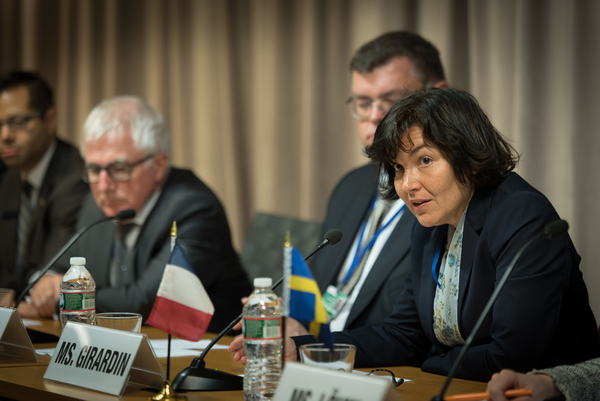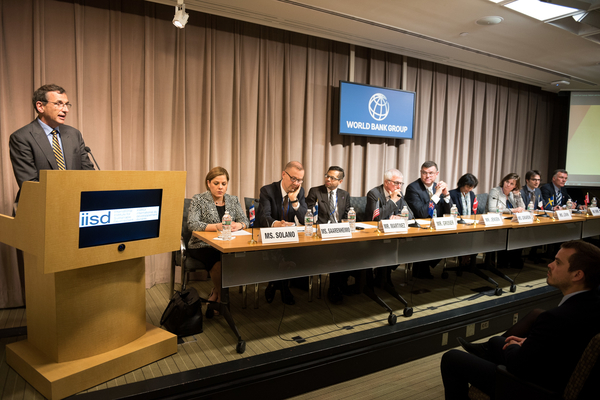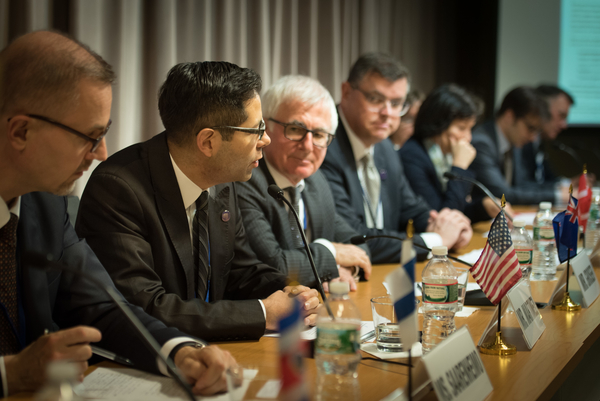Communiqué in Support of Fossil Fuel Subsidy Reform Launched in Washington
On April 17, 2015 in Washington D.C., a group of eight countries known as the Friends of Fossil Fuel Subsidy Reform released a Communiqué encouraging governments to prioritize the reform of fossil-fuel subsidies ahead of the United Nations Climate Change Conference in Paris this year. The Friends, with the support of the International Institute for Sustainable Development, are encouraging other governments to endorse the statement. Both France and the United States have also endorsed the Communiqué.
The IISD’s Global Subsidies Initiative has been a world-leader for more than a decade in the quantification and evaluation of subsidies. The GSI has long made the case that fossil-fuel subsidies are a barrier to sustainable development.
The launch of the Communiqué was chaired by Scott Vaughan, IISD’s President and CEO, and presentations were made by Ministers from the Friends group.
A new motion graphic on fossil-fuel subsidy reform and the Paris Climate Change Conference is available here.
Hashtag: #FossilFuelSubsidyReform
Photo credits: Sam Kittner

Annick Girardin, Minister of State for Development and Francophony

Scott Vaughan, President-CEO IISD

Leonardo Martinez-Diaz, Deputy Assistant Secretary for Environment and Energy, U.S. Treasury Department

Mr Vaughan with Isabella Lövin, Swedish Minister for International Development Cooperation

Ms. Alejandra Solano Cabalceta, Minister Counsellor, Costa Rica, Mr. Tuomas Saarenheimo, Permanent Under-Secretary, Ministry of Finance, Finland with Mr Martinez

Friends of Fossil Subsidy Reform and supporters
About IISD
The International Institute for Sustainable Development (IISD) is an award-winning independent think tank working to accelerate solutions for a stable climate, sustainable resource management, and fair economies. Our work inspires better decisions and sparks meaningful action to help people and the planet thrive. We shine a light on what can be achieved when governments, businesses, non-profits, and communities come together. IISD’s staff of more than 250 experts come from across the globe and from many disciplines. With offices in Winnipeg, Geneva, Ottawa, and Toronto, our work affects lives in nearly 100 countries.
You might also be interested in
This Is What Young People Have to Say About INC-5
The treaty must address the entire life cycle of plastics, youth tell INC-5 negotiators. We couldn’t agree more.
COP 29 Outcome Moves Needle on Finance
In the last hours of negotiations, concerted pressure from the most vulnerable developing countries resulted in an improved outcome on the finance target, with a decision to set a goal of at least USD 300 billion per year by 2035 for developing countries to advance their climate action.
Stabilization Clauses: The hidden provisions that can hinder tax and investment policy reform
Stabilization clauses should no longer automatically be included in contracts between states and investors. If they are, they should, at a minimum, build on the latest international standards on stabilization to avoid being a barrier to sustainable development.
Why Trade Matters in the Plastic–Pollution Treaty Negotiations
The global push to end plastic pollution by 2040 highlights the critical intersection of trade and environmental action, with upcoming INC-5 negotiations focusing on reducing plastic production, consumption, and waste within a fair and effective international framework.